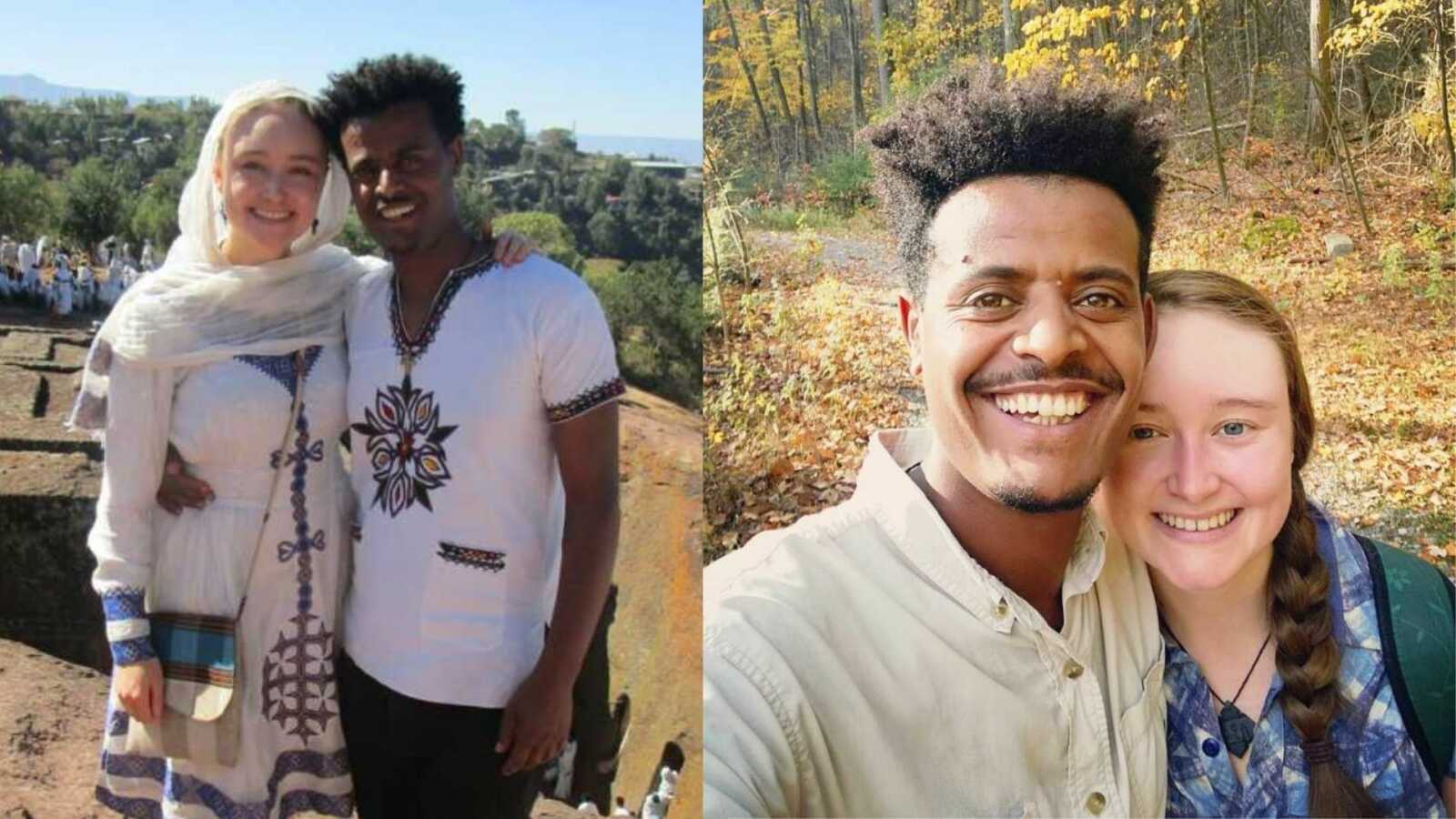Where It All Began
“When I think about the place where I met Tewabe, this is what I remember: Nights spent in tents and sleeping bags beneath star-filled skies surrounded by the unique howl of donkeys, spotting crocodiles while brushing our teeth in the morning, meals on the bank of a river that flows across the desert toward the Nile, and days spent covered in dirt – excavating an archaeological site under the searing Ethiopian sun.
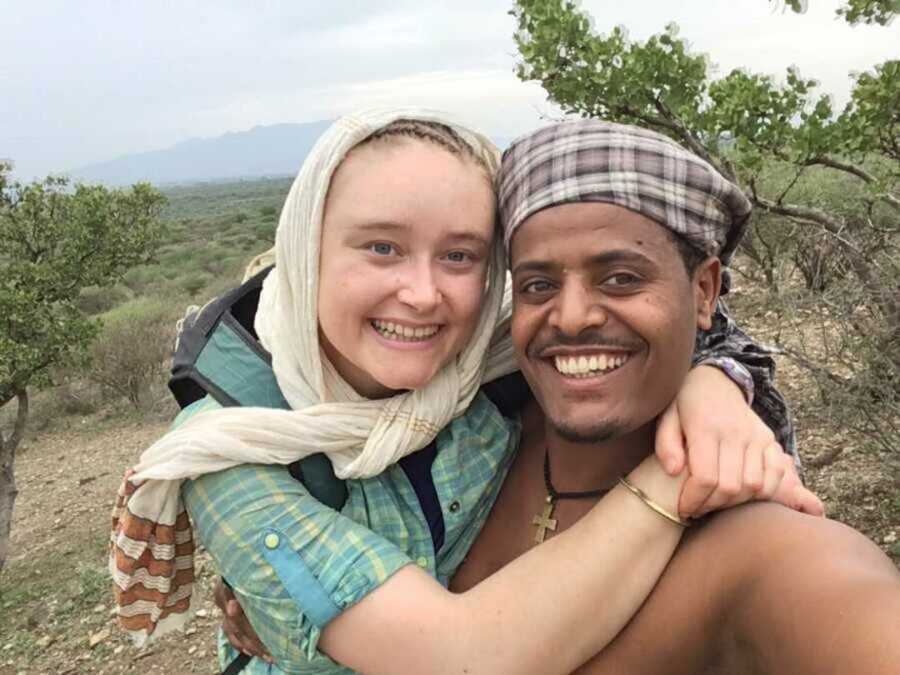
Our story began on December 28th, 2017, when I arrived in the middle of the night at the Addis Ababa airport in Ethiopia with seven other undergraduate students from all over the U.S. We had all been accepted to work on an archaeological excavation. Before sunrise, after just a few hours of sleep, we loaded our bags onto the top of the bus that would drive us for two days to the excavation site. A couple of Ethiopian masters students soon joined us – they would also be working on the excavation.
The bus started driving through the streets of Addis, and we started taking in this new environment for the first time. We had barely driven a minute when the bus stopped to let on another Ethiopian student. He was wearing a black jacket and carrying only a small backpack. He seemed flustered, but he just got on the bus without a word and sat down with the other Ethiopian students in the front of the bus.
This was the first time I saw Tewabe – it turns out he had struggled to find transportation so early in the morning from the far corner of the city where he lived. If he had been just a minute later, he may have missed the bus completely!
I do not remember much about that bus ride other than the spectacular Ethiopian landscapes. I felt more exhausted than ever before, yet I did not sleep. I watched out the window as we drove down into the Blue Nile Gorge then back up again, across fields of teff, and past Ethiopian school children walking on the road. On the second day of driving, we finally made it to the field site in a remote corner of rural Ethiopia close to the Sudan border.
Ethiopian and American students were shy to talk to each other at the beginning, but after several days we all started to become close friends. We affectionately called ourselves the ‘friends in the dirt’ because we were always completely covered in dirt from the daily excavation work. (We were allowed to ‘shower’ using a bucket every three days.)
Every day, I worked as hard as I could during work hours while looking forward to the time after work when I would sit with the Ethiopian students and learn Amharic words from them. Then all the students and professors would sit at a long table looking over the Shinfa River to eat dinner together. As it got dark, the professors would go to their tents and the students would stay up – looking at the stars and the moon, learning Ethiopian dances, and telling stories.
Tewabe says he always admired my hard work and even how my face would constantly get covered in dirt. He felt a connection with me from very early in the project. Personally, I was impressed from the very first day at his ability to make the entire group laugh. Even though his English was not as advanced then as it is now, he still had a natural talent for humor. The two of us began to talk more, and I learned about his childhood in the rural Ethiopian highlands, where he grew up as the fourth of eight brothers.
Our lives were very different but completely complimentary. We both grew up by the mountains (I am from Colorado) and love the outdoors, adventure, and science. We always found ourselves making eye contact from across the table during meals, ‘communicating with our eyes,’ as Tewabe says. I then began to sit next to him at the table so we could talk more.
The Start Of Our Love Story
On the night of Ethiopian Christmas (called Gena and celebrated on January 7th), all the students were dancing together and learning about Ethiopian traditions when all of a sudden he asked me to dance with him. We just held hands and danced together for a couple of minutes, but it was really sweet. I started to suspect he had feelings for me, but I was super shy to talk about it or admit my own feelings. We just continued with our routine after that, talking whenever we could.
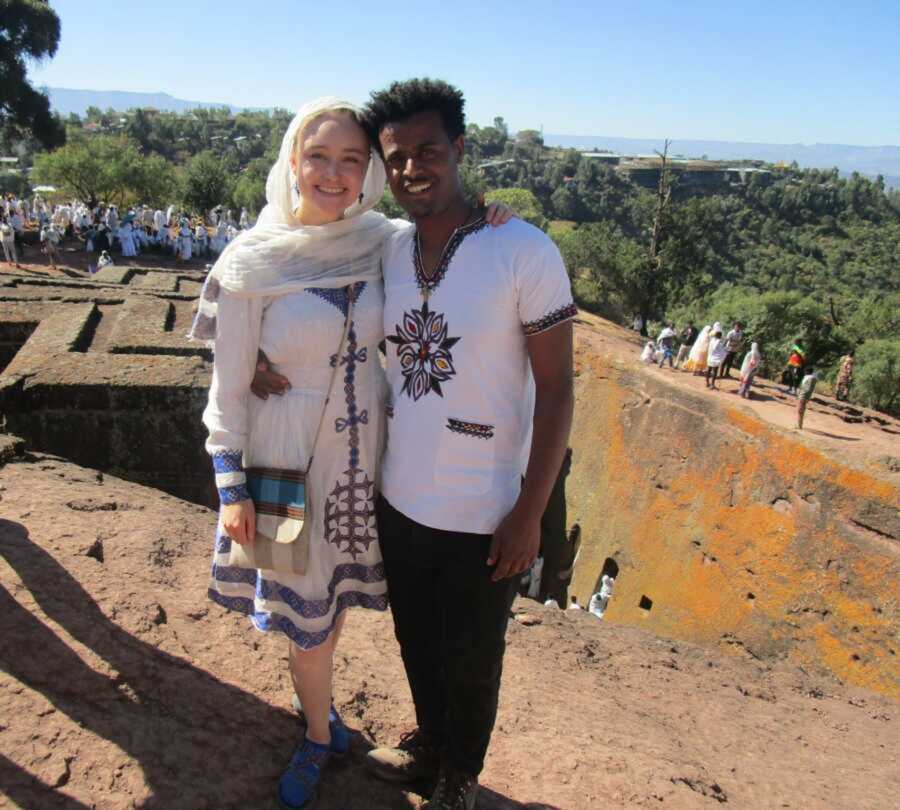
Then, on the eve of Ethiopian Epiphany (Timkat, January 18th), we got our first and only day off from the excavation work. We all went to the nearest village to help organize the school’s library and explore the market. Afterward, the school’s principal invited us for a traditional coffee ceremony at his home. When we were just about to leave, a woman selling jewelry approached our group. She walked directly up to me and presented me with a beaded necklace, trying to ask if I would buy it.
I did not have any cash with me, and I was struggling to communicate this to her (she was from a different ethnic group than any of the Ethiopian students, so none of us could speak her language) when Tewabe suddenly gave her the money and presented the necklace to me, saying, ‘This is my gift to you.’ I would later learn he had been searching for a necklace for me in the market but had not been able to find one!
Later that evening, we were lucky enough to join the local Ketera celebration. For this holiday, each church carries their Ark of the Covenant replica to a place for baptism, accompanied by singing, dancing, and jubilation (the holiday celebrates Jesus’ baptism). I was running, shouting, and dancing with a whole throng of children as the Ark was carried across the desert in a colorful procession. As the sun set and we began to walk back to camp, Tewabe held my hand and helped me navigate.
There was no trail, and every plant we came across in the dark was covered in sharp needles. The stars began to appear, and Tewabe taught me their name in Amharic – ‘kokeb.’ Then he said, ‘If a person has beautiful eyes we say ‘kokeb ayin’ – starry eye.’ He began to tell a story of two explorers who were walking through a forest, but they got lost and had a child with kokeb ayin.
I was so confused but so happy. I never wanted this walk to end, but unfortunately, we reached the camp soon after that without getting lost.
A few nights later, on January 23rd, we were walking and holding hands when a dog started barking close to me. Dogs in rural Ethiopia primarily serve the role of guard dogs, and they can be quite aggressive. Tewabe gently pulled me to his other side, saying, ‘Come over here. I don’t want the dog to get you because I love you.’ I was shocked. He did not completely realize the cultural significance of his words. Yet I was living in an alternate reality at that moment, so I said it back: ‘I love you too.’
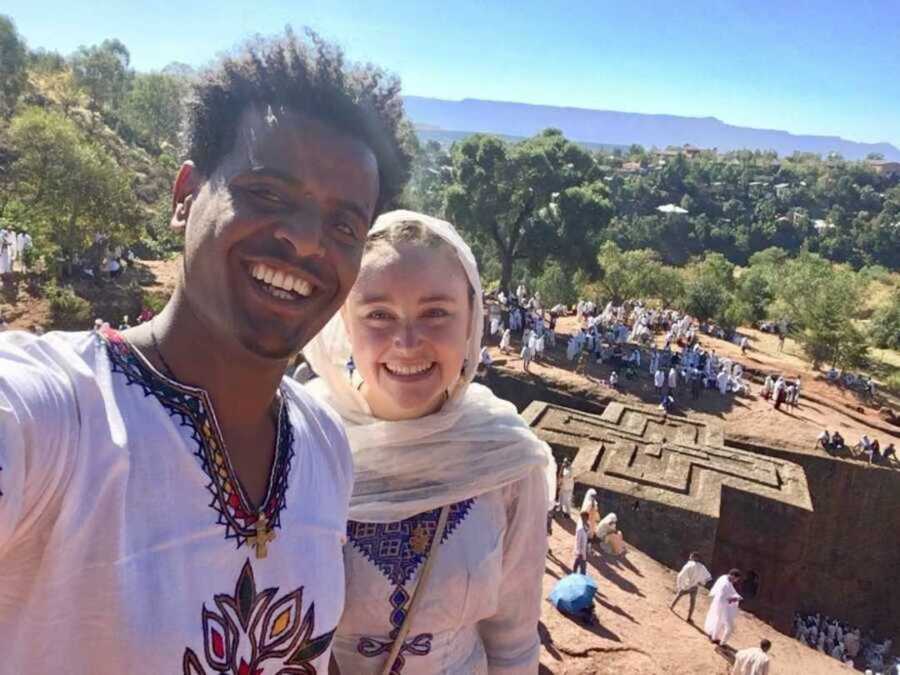
He was so happy to hear me say that, he started talking about all the things he would show me about Ethiopia when we got the chance. But we were both really self-conscious about the whole situation, not knowing what the other students and professors would think, so we decided to keep our relationship a secret from the rest of the group. Nevertheless, we now consider this date to be our anniversary.
This Isn’t The End
Sadly, I had to return home to Colorado soon after that. I had no idea what would happen after I left. We had not gotten a chance even to talk about our plan, because we were always with the group and were trying our best to keep it secret. I was not sure when, if ever, I would be able to return to Ethiopia, and I had no idea whether it would be possible to maintain a transatlantic relationship. I felt in my gut and in my heart that Tewabe and I had a serious connection, but my brain kept telling me this was too crazy, too different, to make it work.
It turns out Tewabe was completely committed the entire time, without a doubt in his mind. We started messaging on WhatsApp and Facebook Messenger as soon as I left, and he won me over entirely with his sweet messages. We continued to talk as much as we could, every day. This was never easy.
We had a time difference of 9-10 hours and still had some difficulty communicating everything exactly as we intended because of our language difference. This never felt like too much of a barrier, although our communication style changed over time.
In the beginning, we communicated mostly in simple sentences, drawings, and photographs. Tewabe’s English improved rapidly, and I learned more Amharic (though my progress has been less rapid!). Even more difficult was Tewabe’s phone service situation in Ethiopia. He had terrible phone service and no internet at his home, and he got cell phone data by buying ‘mobile cards’ in the market.
The poor service made it impossible to have a conversation over a video call, and even voice calls were difficult. We resorted to using a lot of voice recordings and written messages. Even then, sometimes in the middle of a conversation, Tewabe would run out of data… then I would wait until he bought more mobile cards from the market before we could talk again.
Luckily, I soon found out I was awarded a fellowship for graduate school, giving me the financial means to be able to travel back to Ethiopia. I booked a flight, and we planned a five-week-long adventure. I was so nervous during the flight. Our relationship had changed so much since the last time we saw each other, and this time it would just be the two of us for five weeks!
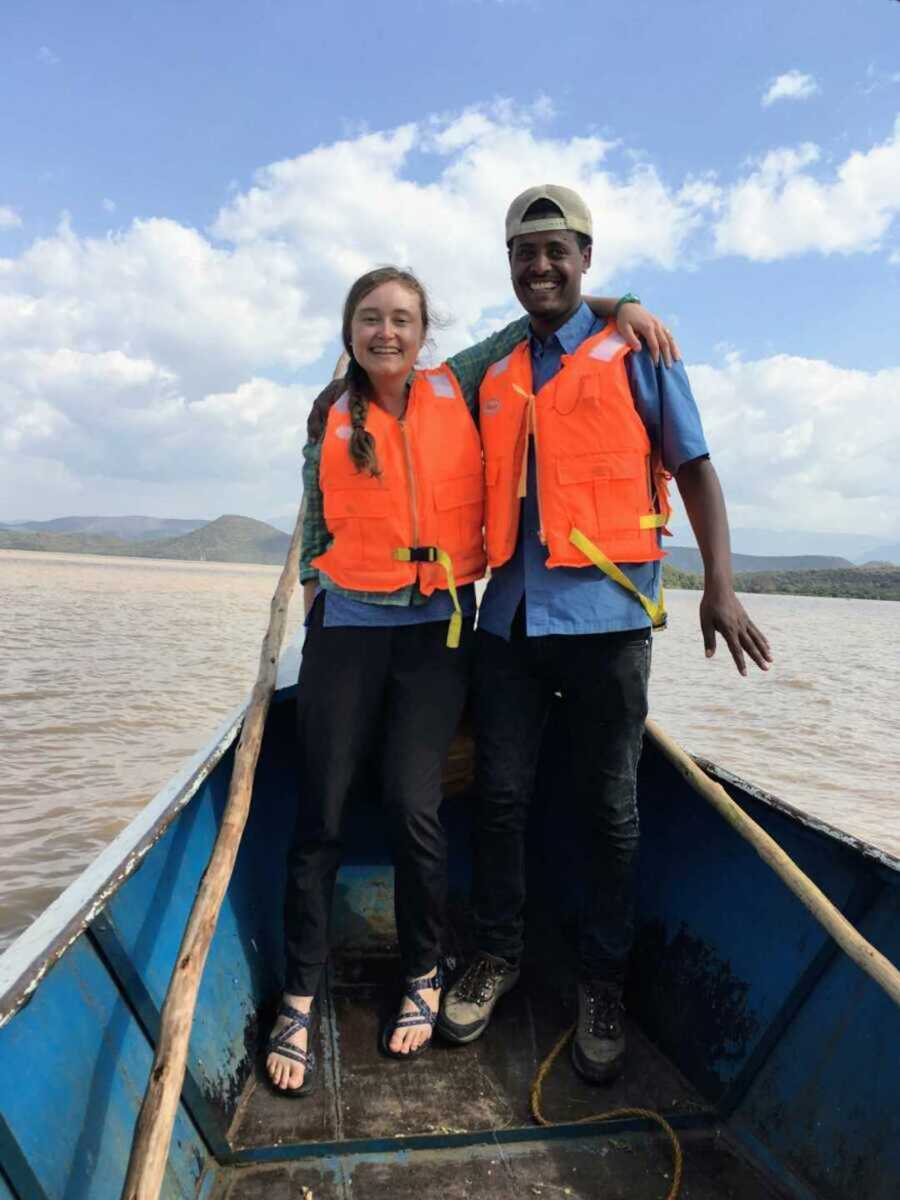
Tragedy Hits
Tragedy struck Addis Ababa while I was on the plane, unbeknownst to me. An explosion at a rally for the Prime Minister killed three people and injured over 150. Chaos then spread through parts of the city. Tewabe was waiting for me outside the airport for hours (there is no indoor waiting area) while his brother worried about his safety and urged him to come home. Fortunately, he stayed and was safe. When I arrived, his phone had died, and I had no idea how I would find him!
After navigating through the airport, my terribly jet-lagged and dazed self finally walked out into the dark night and the crowd of people. I clearly stood out as a confused foreigner as I searched through the sea of talkative taxi drivers and other Ethiopian men for a familiar face. Finally, I saw him walking toward me with a bouquet of roses! It was a moment of huge relief and happiness.
In the morning, he took me to meet his older brother, his wife, and their newborn son – his only family who lived in Addis Ababa. They were so excited to see me, and I was greeted with a wonderful coffee ceremony and more food than I could eat!
A few days later, we started off on our big adventure, traveling all over Ethiopia using only public transportation on crowded busses. We started in Bahir Dar, where we rode a boat to visit the Coptic monasteries of Lake Tana that were built during the Middle Ages.
Then we hiked to the 150-foot tall Blue Nile Falls before visiting the medieval castle of Gondar. We drove to the magnificent Simien Mountains, where we backpacked for three days and saw the endemic Walia ibex and gelada baboons. Next, we traveled to the northern city of Aksum, which was once the capital of the Aksumite Empire.
From there, we drove to the Lalibela with its rock-hewn churches carved out of the ground in the 12th and 13th centuries. We then went to Harar in eastern Ethiopia, where we fed wild hyenas, and Lake Langano in Ethiopia’s Great Rift Valley.
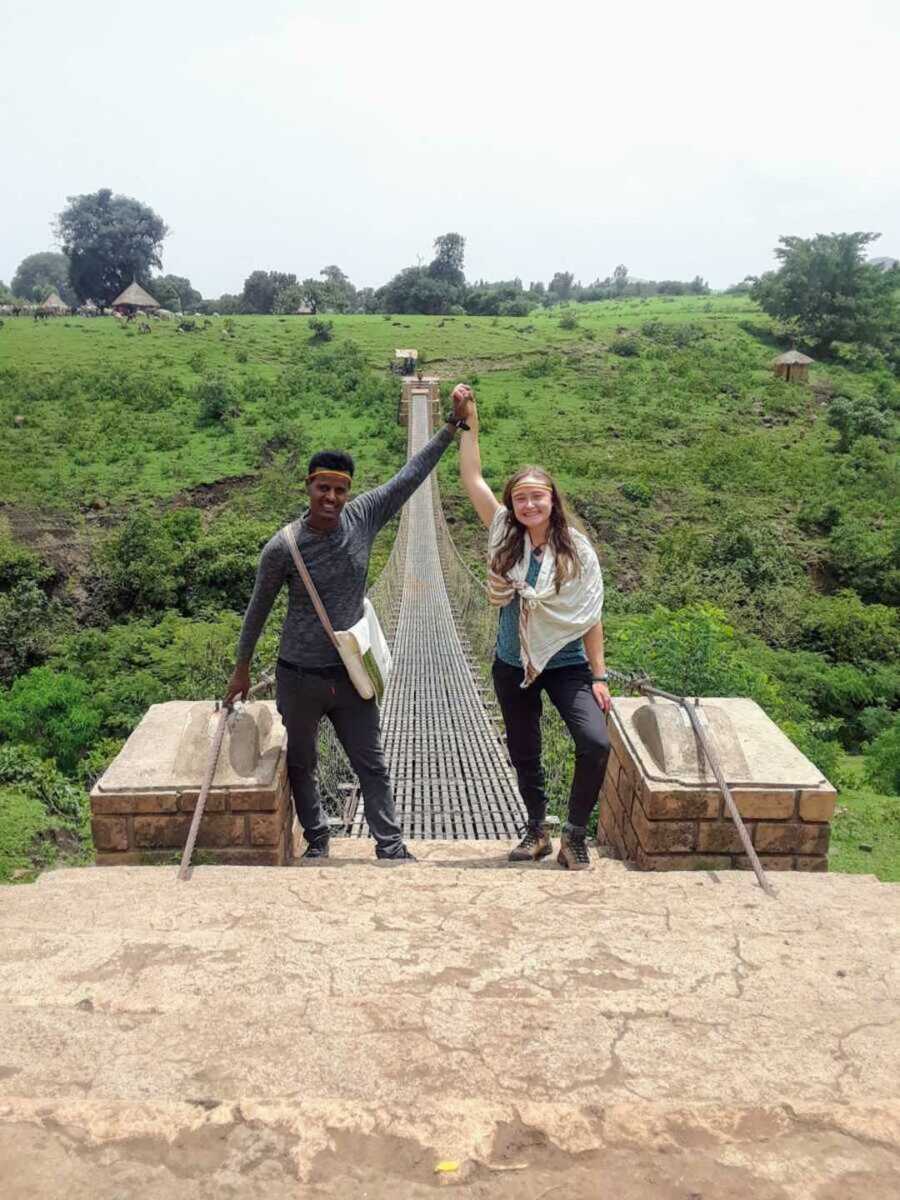
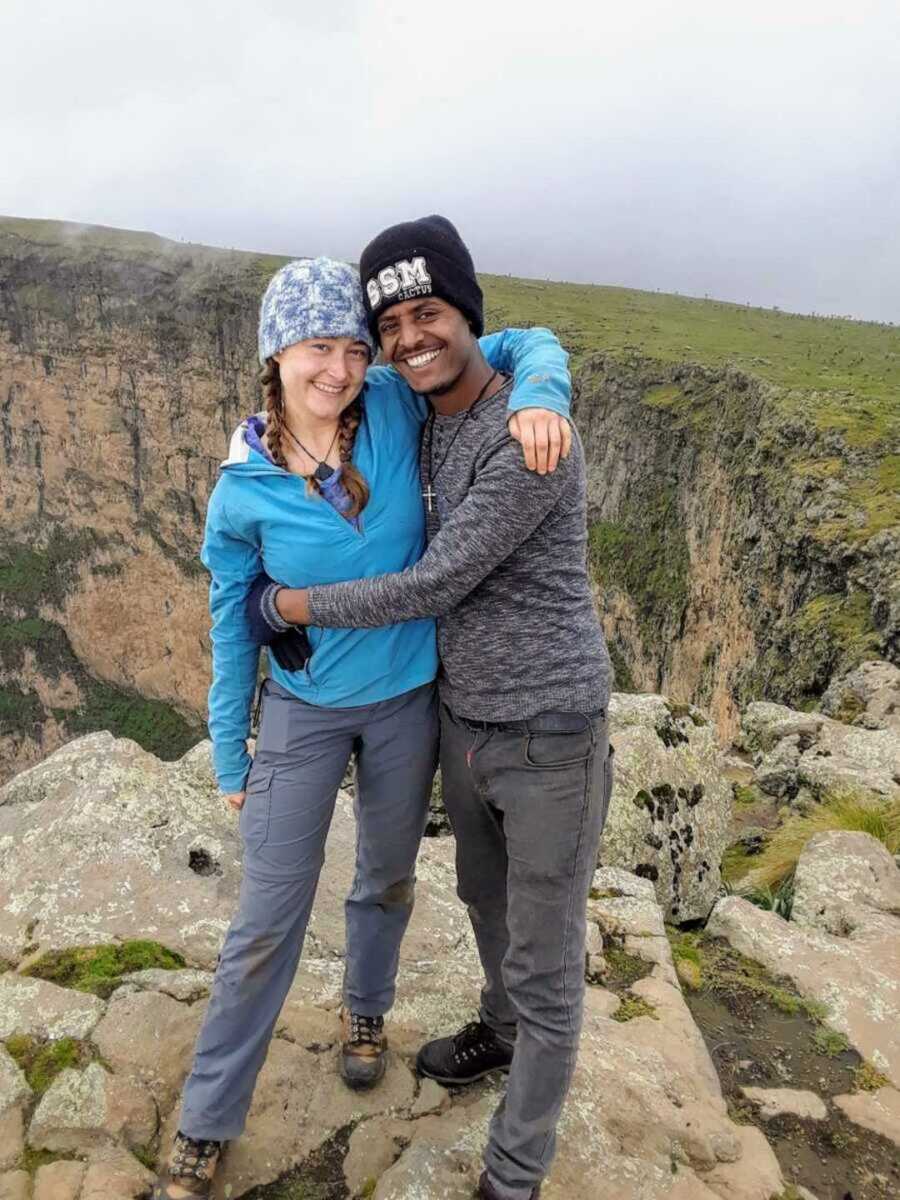
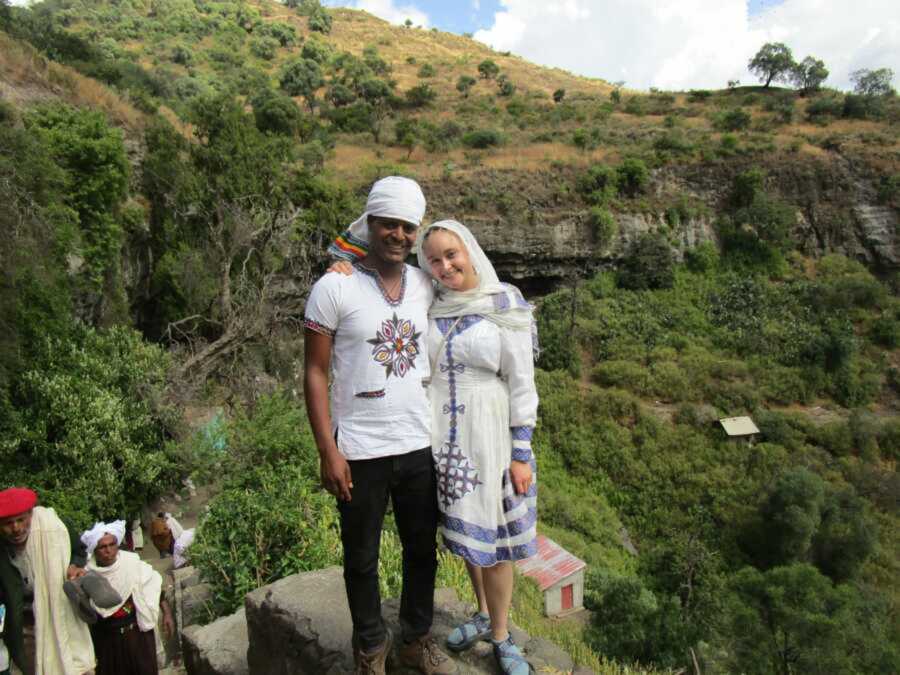
Confessing Our Love
It was even harder to say goodbye this time after all these amazing adventures together, but I knew I had to get back to my grad school program. Just as I was boarding the plane to fly back to the U.S., I confessed our relationship and my love for Tewabe in the group chat with all the students who had been involved in the archaeological excavation. (They knew I had gone back to Ethiopia, but they did not know the true reason for my travels!)
I was so nervous about what everyone would say, even these people who we both considered to be friends, that I immediately switched my phone to airplane mode and only switched it back when the plane landed. When I finally looked at the messages, everyone was just so incredibly supportive and excited for us.
On my next visit to Ethiopia, I got to meet Tewabe’s parents and some of his younger brothers. They still live in the place where he grew up, a beautiful rural area called Simada in the Ethiopian highlands. It took us three days to get there from Addis using public buses.
This is not a place tourists visit, so as soon as I stepped off the bus, everyone around us began to stare. Despite my best attempts to fit in, I attracted a lot of attention as an unexpected foreigner in this remote place. Tewabe contacted a motorcycle driver, and somehow we crammed three people and two large backpacks (we brought sleeping bags and pads to sleep on the floor of the mud hut) onto one small motorcycle to drive from the bus stop in the village to Tewabe’s family home. We arrived right before sunset.
Tewabe had a very traditional upbringing. His father, who we call Ayiye, is an Ethiopian Orthodox priest who is highly respected in the community and called on for healing purposes. His mother, who we call Engocha, is also respected as a community leader. Both make a living through farming, as with most of the other people in this community. When we arrived, Ayiye was standing outside. The first thing he did was to hold out the large metal Orthodox cross which hung around his neck to bless me.
Tewabe had prepared me for this. Ayiye touched the top of the cross to my forehead, then I kissed the bottom. After that, he smiled and completely accepted me. We then entered the home, where Engocha was preparing dinner with the younger brothers. She was so happy to see us and immediately treated me like one of the family.
It was so comforting to be welcomed like this after all the stares in the village. I felt so at home, it was easy to forget we could not speak the same language.
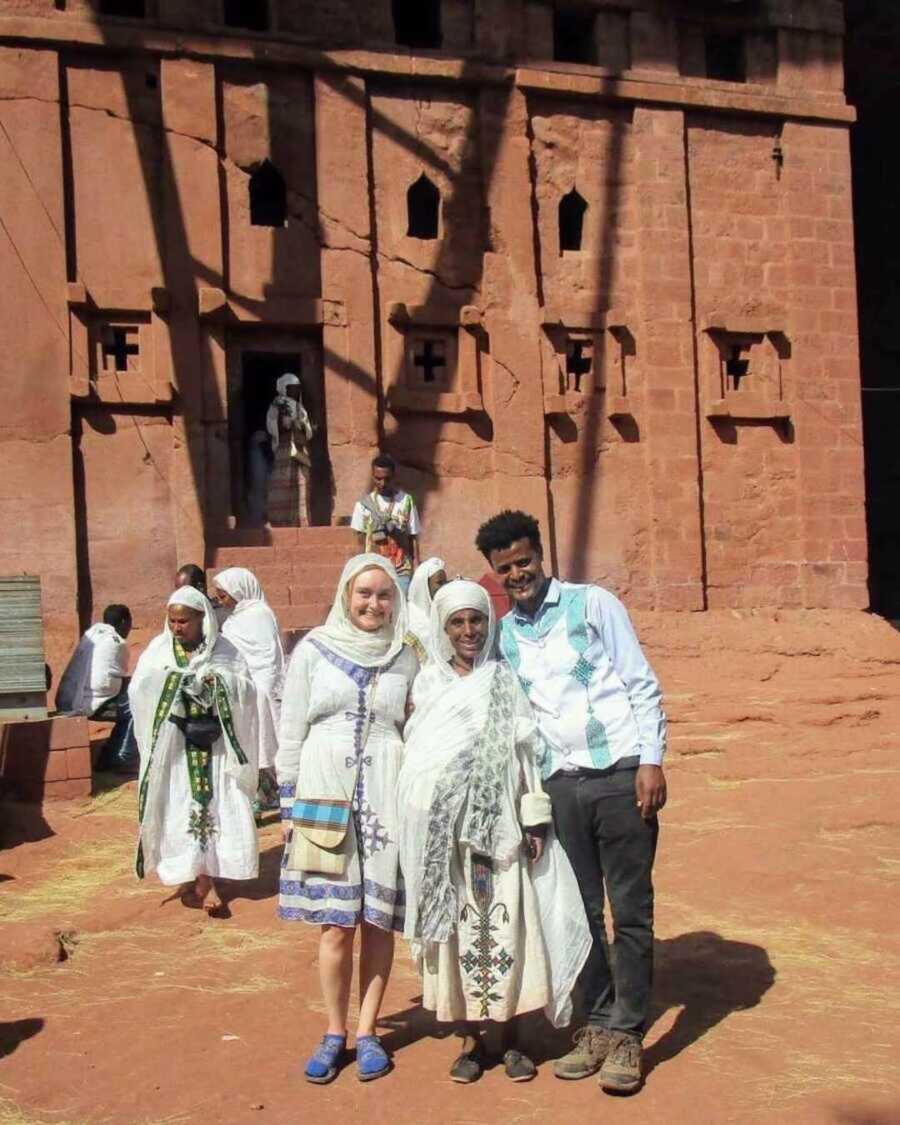
The Surprise Proposal
On one of my trips to Ethiopia, Tewabe gave me an incredible surprise. After dinner, we returned to our hotel and he ordered a bottle of wine. Our room was on the top floor and the full moon was shining bright, so he invited me out to the balcony to see the night sky and city lights.
While I gazed at the moon, he went back inside and returned with two glasses of wine. Then he placed them in the corner, knelt on one knee, and raised his hand to present me with a little box – all without saying a word.
Although a bit confused, I could clearly tell what was going on. I opened the box and found… nothing! He acted surprised, saying, ‘Oh that sneaky jeweler, he must not have given me the ring! I’ll call him right now… actually it’s too late. I’ll call him in the morning – here, just relax and drink this wine.’ I took the glass from his hand and began to take a sip… and almost swallowed a little gold ring.
Although my heart was happy to accept the proposal, it was difficult to tell even my closest friends and family. I was so scared of what they might think – after all, they had never met him and there was still no way for us to live together. When I returned to the U.S., I put all my effort into finding a way for Tewabe to visit America.
I almost lost all hope after an emotional call with a lawyer, who told me it would be near impossible for him to get a visitor or student visa because of our relationship.
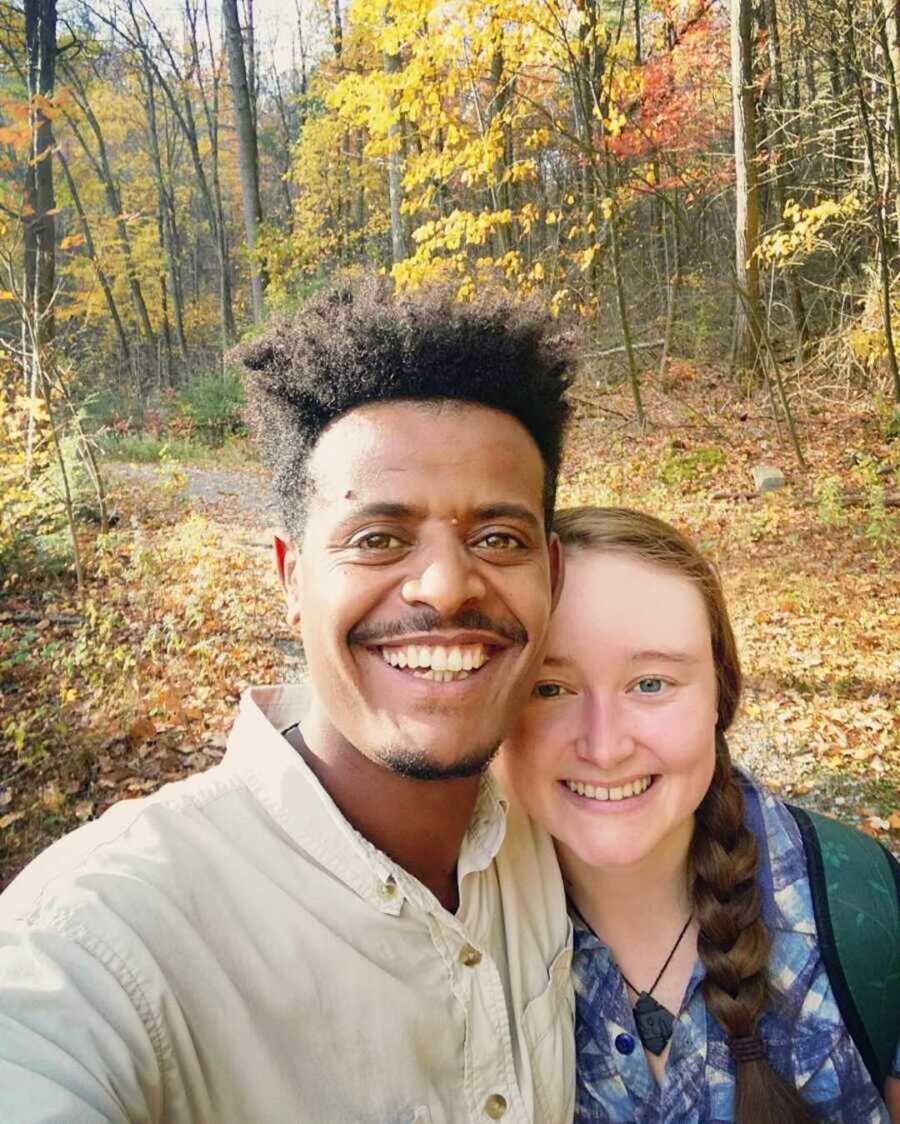
Eventually, we decided to pursue a K1 ‘Fiancé’ Visa, which meant that the first time my family would meet him would be just a few months before we had to get legally married (besides my dad, who traveled to Ethiopia to meet him). This was by no means a perfect option, but we were grateful there was at least a path for us through the difficult U.S. immigration system.
We began the process, filling out form after form after form, compiling over 100 pages of documentation to prove the legitimacy of our relationship, paying thousands of dollars in visa fees, and waiting anxiously for the judgment of a consular officer about the value of our love.
Tewabe Meets The Family
Finally, the visa was approved in February 2020. Tewabe arrived in Colorado in early March (his first time ever outside of Ethiopia!), where we enjoyed one week of fun with my family. He got to see snow and even tried cross-country skiing and rock climbing, all for the first time! We then flew back to my apartment in Pennsylvania – where I was living for school – right as COVID was declared a pandemic.
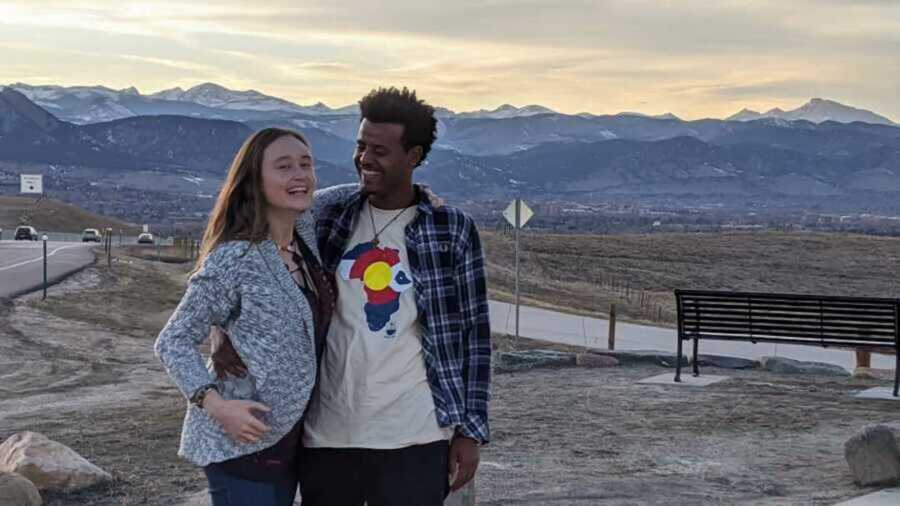
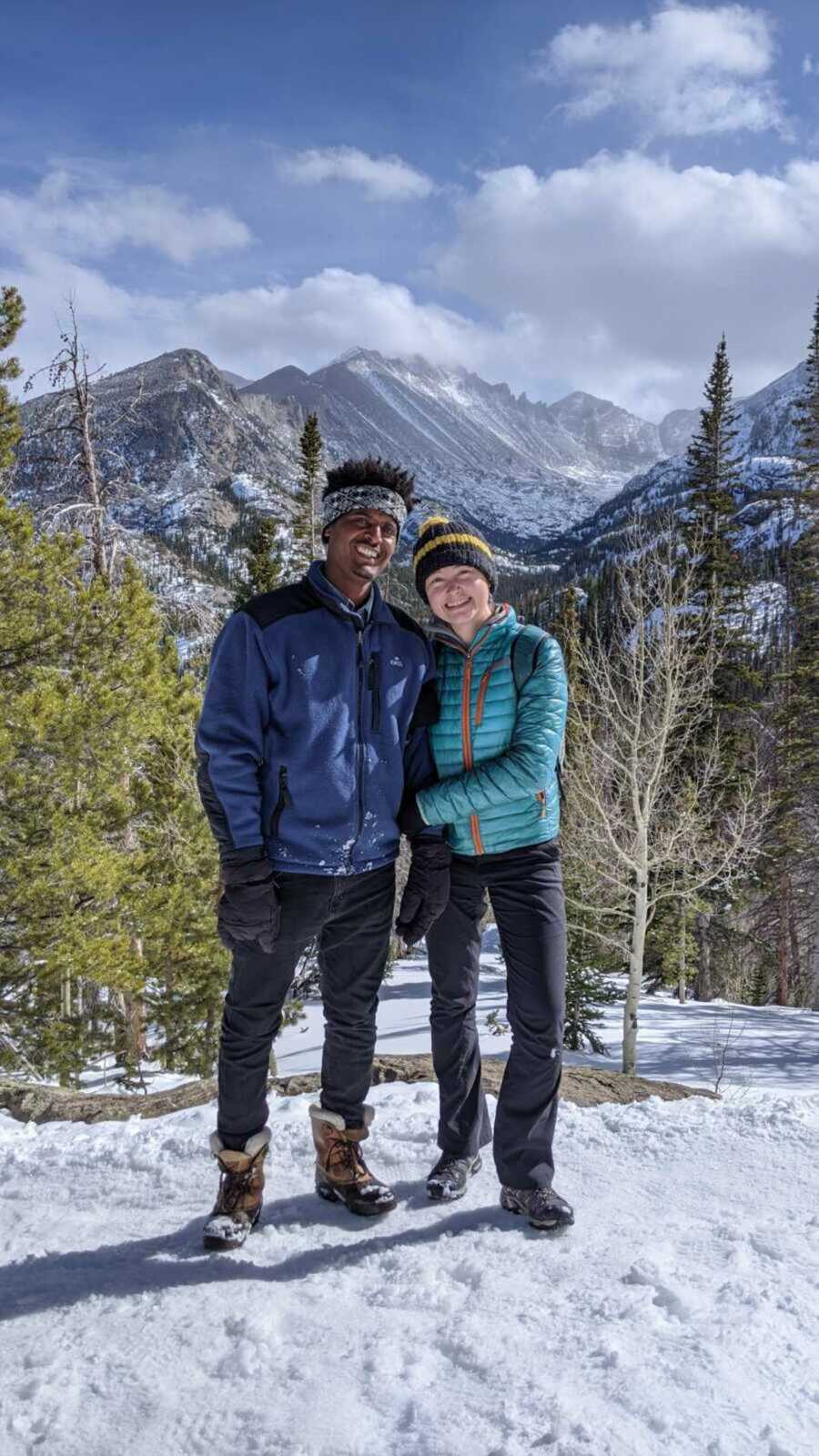
A Happy Ending
We had to get legally married within 90 days of his arrival for him to be able to stay (one of the conditions of the visa) and had planned to go back to Colorado for a small celebration with my family, but the pandemic changed those plans. So, we got legally married in May with only a few friends present as witnesses.
We are still planning to have big wedding celebrations in both Ethiopia and Colorado, incorporating traditions from both of our cultures.
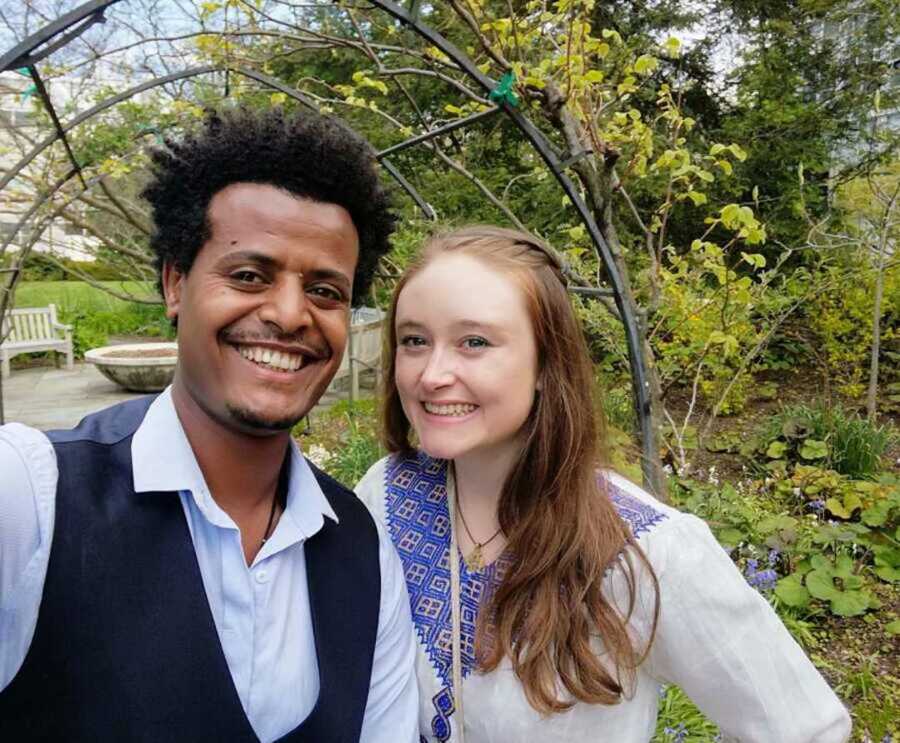
Now, we are living happily together in Fort Collins, Colorado. Tewabe is finally a U.S. Permanent Resident, and he recently started a Ph.D. program at Colorado State University. I am working remotely for my Ph.D. program at Penn State. We hope to spend time living in both the U.S. and Ethiopia in the future, but for now, we are just looking forward to a time when we can safely visit Tewabe’s family.
Meanwhile, we enjoy sharing our story of love, travel, science, and immigration. Sharing our story has not always been easy and did not come naturally, but the decision to do so has brought so much support, solidarity, and happiness. We’ve connected with so many wonderful multicultural/long-distance/immigrant couples and have been so surprised by all the heartwarming messages of encouragement. To others in similar situations, I encourage you to share your stories too and to seek out supportive communities of people who understand what you are going through. Please feel free to reach out to me for advice about how to find these communities!”
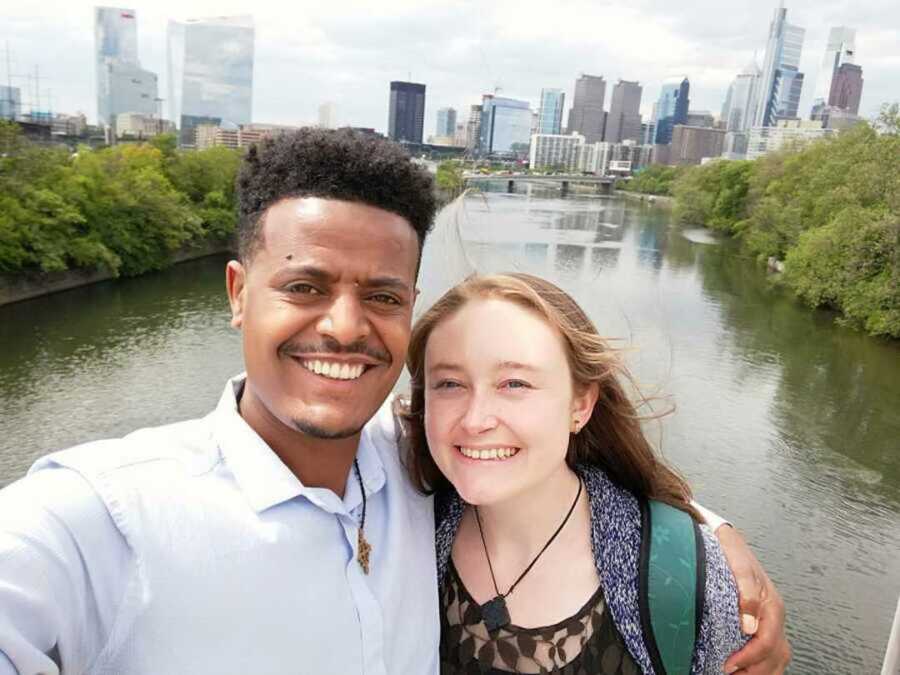
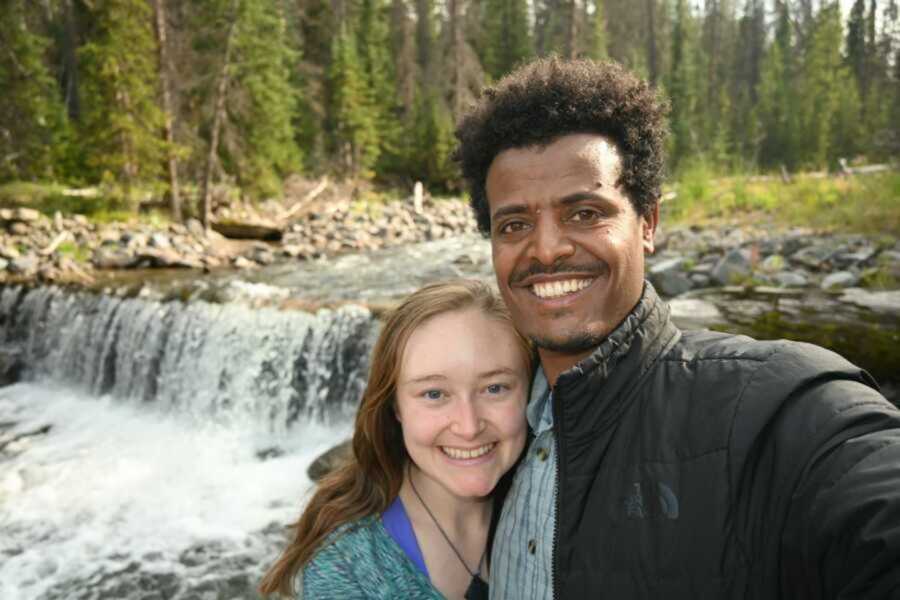
This story was submitted to Love What Matters by Sierra Melton of Fort Collins, CO. You can follow her journey on Instagram and Twitter, and follow Tewabe on Twitter. Join the Love What Matters family and subscribe to our newsletter.
Read more stories like this here:
Provide beauty and love for others. SHARE this story on Facebook with your friends and family.

